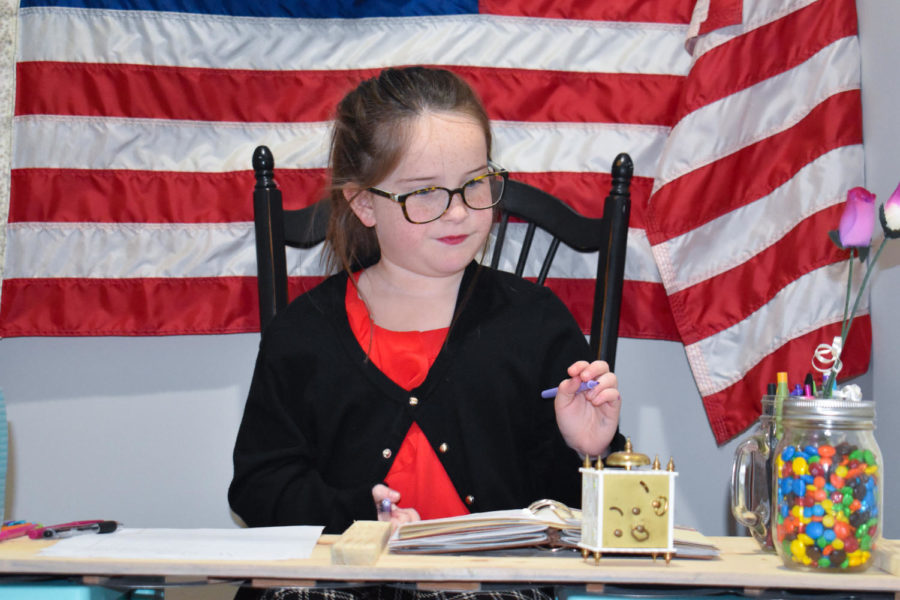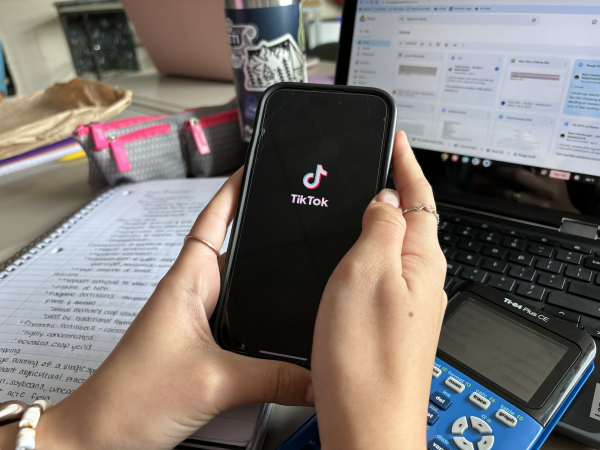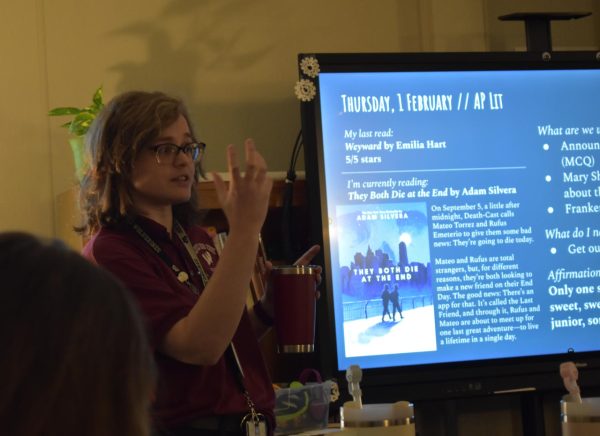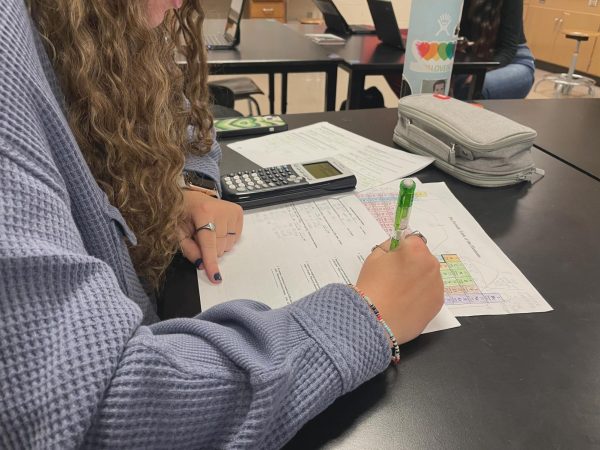The Presidential Election of 2020: Will a woman run the White House?
Seven year old Bella Hoover pretends to be President, her dream might not be far out of reach.
In the year 1920, women weren’t considered smart enough to cast a vote in government elections. According to tolerance.org, women were considered “childlike and incapable of independent thought.” Sneered upon as irresponsible, women erected a movement in 1840 to get the women’s suffrage show on the road. Nearly 100 years later, four women announced their presidential campaigns within a few weeks of one another. Not to mention, they are all from the Democratic party. There could potentially be more women willing to launch their campaigns for both sides of the aisle. Having a woman as the Chief Executive of the U.S. has been a floating thought, and voters everywhere are eagerly seeking its manifestation.
Guidance Counselor, Melissa Ansbacher, believes that we shouldn’t vote for a candidate based on gender.
“We should vote based on what these women represent and what they say they’re going to do,” Ansbacher said.
Media Center Specialist, Dorothy Corrigan, agrees that we should vote for candidates based on their platforms and what they offer as an individual to bring to the presidency.
Women around the world do need to see that the United States is also ready to vote for the best person for the job, regardless of their gender
— Corrigan
“Experience isn’t always the thing that makes you vote for someone. It should be their platform. It should be what they bring to the table, and what they want to have as their focus in a presidency,” Corrigan said. “I care about what a president plans to do, and that’s how you should vote.”
The first four female candidates to cast their bids for the Democratic party nomination were Tulsi Gabbard, Kirsten Gillibrand, Kamala Harris, and Elizabeth Warren. Each candidate has a unique educational background and socio-political experiences that have equipped them to potentially fill the role of the president. The hyperlink will take readers directly to their respective websites.
The Candidates
Elected in 2012, Gabbard is currently in her fourth Congressional term as a representative of the state of Hawaii’s 2nd District. In addition to her congressional experience, she is one of the first two females to serve in Congress as a combat veteran. Gabbard was a Major in the Hawaii National Guard and was the first state official to step down from their position in public office to serve in a war zone. Her signature issue is American military intervention overseas, which she is opposed to.
First elected to Congress in 2007, Gillibrand served one term in the U.S. House of Representatives, as a representative of New York’s 20th District. Under President Obama’s administration, Gillibrand resigned from the House and replaced, then newly appointed Secretary of State, Hillary Clinton’s seat in the Senate. Senator Gillibrand is known for her advocacy for reform on sexual harassment cases and holding the government to a respectable degree of transparency for citizens. The signature issue that she has most notably worked on is limiting gender inequalities and disparities that occur in opportunities between men and women.
Former Attorney General of California, Harris is a strong public advocate as she has served, and currently serves, in many sectors of the government. Her career began with holding the position of Deputy District Attorney of Alameda County (1990-1998), followed by being the District Attorney of San Francisco (2004-2011), Attorney General of California (2011-2016), and U.S. Senator (CA; 2017-Present). Harris is also a member of the Senate committees on Homeland Security and Government Affairs; Budget; Judiciary; and the Select Committee on Intelligence. Harris is notably known for her middle-class tax cut legislative proposal and for her advocacy for her liberal agenda on civil-rights.
Former Harvard Leo Gottlieb Professor of Law, Warren was elected to the U.S. Senate in 2012, under the second term of the Obama Administration. Senator Warren is well-known for her steadfast candor, and for her 2007 proposal of the creation of the Consumer Financial Protection Bureau, which began its operations in July 2011. Warren was also appointed by President Obama as Assistant to the President and Special Advisor to the Secretary of the Treasury. Warren also serves on the Senate Committees on Banking, Housing and Urban Affairs; Health, Education, Labor and Pensions; Energy and Natural Resources; and the Special Committee on Aging. The Senator specializes in advocacy to limit income inequalities and advocacy for America’s middle class.
Ansbacher is the niece (by marriage) of activist, philanthropist, academic, and internationalist, Swanee Hunt, who is also the founder of Swanee Hunt Alternatives. Hunt advocates for women’s rights across the globe and has inspired Ansbacher to believe in the importance of the mission.
“She [Swanee Hunt] finds that when women finally get a seat at the table, that’s when things start to change,” Ansbacher said. “My point is to try to believe that would happen here. It’s one thing to have them run, but they’ve got to physically be at the table.”
Sexism has been incredibly plaguing to the journey to the leadership of the American woman. American History teacher, Ryan Abrams, sees that women have the fortitudinous capability to withstand the duties of being president.
“I think it’s just a matter of time before a woman becomes president of the United States,” Abrams said. “You do see women around the world that are providing examples of women stepping up out of the shell that they had been put into [in] the past generations.”
The Journey to the bids
Earning seats in governmental positions of power has been a fight for decades. The first woman to ever cast a presidential bid for a major party was Shirley Chisholm in the election of 1972. Chisholm was a Senator, like Harris, Gillibrand, and Warren, and faced tremendous adversity as she took a valiant step to run for the presidential nominee of the Democratic Party. Corrigan witnessed this campaign and feels that Chisholm’s courage has emboldened millions.
“She [Chisholm] was such an incredible force. She did so much for so many people during her political career. She was a pioneer in terms of being a woman and also being African-American. It was a remarkable thing to watch her,” Corrigan said.
With the current zeitgeist, the women in the running seem to have a much more robust stature and confident chance in being elected in the primaries. To their benefit, misogyny and sexism have been openly condemned in many different facets of American life. Women are still fighting, nearly 50 years later, to be viewed as capable of holding demanding positions of power.
“Angela Merkel has a very powerful position as a German Chancellor and she’s probably the most powerful woman in Europe,” Corrigan said. “Women around the world do need to see that the United States is also ready to vote for the best person for the job, regardless of their gender. Gender should not be the reason that you don’t vote for someone.”
The U.S. presidential election of 2020 will certainly be one for the books, with the ability to make history at its fingertips. As the list grows with female candidates, the people will speak, and in 2021 America may have high heels stationed behind the desk of the Oval Office.
“Demanding a voice is something that I think is very important rather than sitting by and hoping that it comes,” said Abrams. “You can’t just wait and hope that something comes, you’ve got to go out and seek it. You’ve got to go out and demand it. I think that women are starting to do that and it started well ago, and the #MeToo movement has helped carry that along as well.”



















Dorothy Corrigan • Mar 22, 2019 at 8:43 am
Gabby,
You are a really good writer. You have captured the essence of the struggle for women’s equality. Thank you so much for including me in this article. I feel very strongly that your generation needs to be the ones who break through. Everyone needs to vote….for the most qualified person.
Keep writing – you have talent!